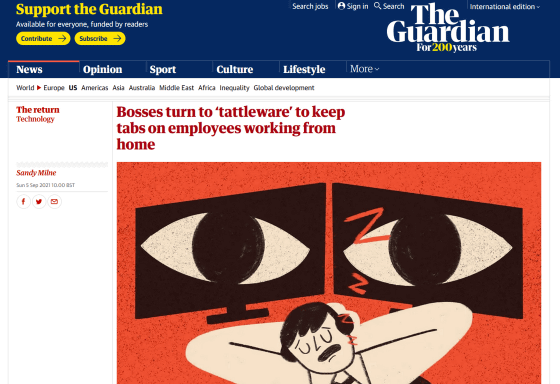Working from home accelerates 'employee monitoring' and puts privacy at risk

As a result of shifting to remote work due to the pandemic of the new coronavirus infection (COVID-19), many people should be happy to be freed from troublesome commuting and troublesome exchanges in the office. However, in some cases, the increase in remote work will strengthen 'monitoring by the company and bosses', and there are concerns about employee privacy and diluting the boundaries between public and private.
Bosses turn to'tattleware' to keep tabs on employees working from home | Technology | The Guardian

David, who was interviewed by The Guardian, a major British newspaper, said he was tired of unfamiliar work and communication with colleagues at the company he joined after graduating from university. At that time, the COVID-19 pandemic closed the office in Virginia, USA, and the work was transferred to remote work.
Initially, David thought that remotework would free him from political bargaining and chatting in the workplace and would be a great break from the hassle of face-to-face. However, less than a week after remotework began, David's team decided to introduce an employee monitoring tool called Sneek.
When Sneek is turned on after work starts, every minute a laptop webcam takes a picture of the employee and it is listed in a 'digital meeting room' that can be viewed by the entire team. You can start a video call by clicking on the displayed face photo, and if you find someone who is skipping work, you can transfer the evidence photo to team chat through Slack integrated with Sneek.
Sneek co-founder Del Currie claims that the software is intended to 'reproduce the office.' 'We also 100% understand that many would think this is a privacy breach. Sneek is not the solution for those who feel it, but they consider their colleagues to be good friends. There are many teams that want to stay connected when they work together, 'says Currie.
However, Sneek was a big mistake for David, and he quit his job less than three weeks after its introduction. 'I signed up to manage the company's digital marketing, not to live stream my living room,' said David.

Employee monitoring tools like Sneek were a relatively low-demand niche market before the COVID-19 pandemic. However, with the introduction of remote work by many companies in the spring of 2020, the situation has changed and employee monitoring tools are rapidly gaining attention.
Employee monitoring tools provide services that monitor employee online activity and assess productivity, such as screen screenshots, keystroke log browsing tracking, and more. Some of them provide a function to record voice through a PC and a function to remotely control an employee's PC, and tools that can be used not only on PCs but also on mobile devices have appeared.
In addition, companies do not always use dedicated employee monitoring tools, but they work with their IT departments to monitor employees by flagging 'emails using specific words'. There is also. For example, a company may be able to detect that a particular employee is looking for a new job by monitoring emails that contain words such as 'recruiter' and 'salary.'
'There are no signs that this (increasing employee monitoring tools) trend will slow down,' said Juan Carlos , a digital researcher and privacy advocate at the University of Melbourne, at least to the best of his knowledge. , There is no movement to amend the law or strong opposition from employees.

In this trend, research on online monitoring and productivity is also active. A
Meanwhile, in a 2020 survey , three-quarters of workers said, 'Even if they are monitored by their employer, they will not improve their productivity.' The possibility of giving is also suggested. Lions said, 'In other studies we've seen, workers are essentially'if managers intend to monitor everything I do, I'll do nothing more than they expect. '.'
The situation has changed with the rise of employee monitoring tools, and if you work privately on a PC with monitoring tools installed, your employer may lose track of your Internet bank passwords and Facebook messages. .. 'Before the pandemic, there was (more clearly) the line between work and play, in other words, surveillance was separated by doors,' Carlos points out.
Of course, most employers only want to monitor their employees on duty, not even private monitoring. However, if a boss or employer abuses surveillance tools to snoop on overtime employees, many Western countries do not have sufficient legislation to protect them. 'But good or bad, surveillance software is considered a trade-off with remotework, so many people are willing to accept it,' said Carlos.

Related Posts:







